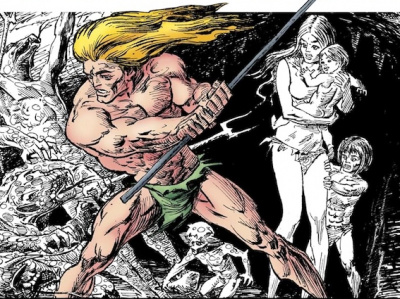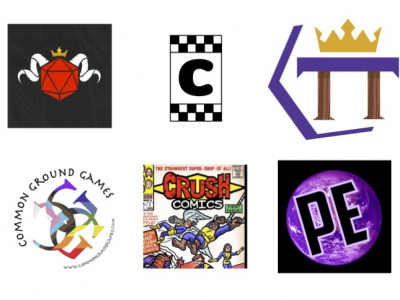July 7, 2000. Madison, Wisconsin. Safe in my Midwest refuge, I can still hear the sounds of the fighting emanating from both coasts as the Dot Com Wars of 2000 rage on. The bodies are piling up, and the pace of change is ferocious. From the front, this dispatch will provide some news and commentary on the commerce and content sites focusing on what we called the 'entertainment hobbyist' at Next Planet Over. Some of these stories have been reported elsewhere, some not, and this isn't a comprehensive list by any means, either of sites or events. I'll just give you a sampling of some recent events and wrap up with a few observations on the carnage.
Looking first at e-commerce sites, the eHobbies.com acquisition of Nextplanetover.com closed a little over a month ago, and the NPO site is currently co-branded with the eHobbies brand. The co-branding is via a logo and link across the top of the page if you access the site through the NPO.com url, and via a full eHobbies top nav bar if you access the site through the comics and action figures tab on the eHobbies site. Otherwise, the NPO site continues much as before (with a totally reconstituted staff located in Santa Monica), with very active boards, daily merchandising and content updates, a great new releases store, backlist tied to Diamond's inventory and some new features including 'eHobbies TV' a cool application of streaming video in which celebrity interviews are available on the site. Current interviews are model/actress Alley (Alley Cat) Baggett and Aria creator Brian Haberlin. Co-branding is much more heavily eHobbies in the print advertising I've seen than it is on the site, perhaps portending a trend for the future.
Although the ActionAce.com site is still up, they're no longer taking orders (as of June 20th) and content does not appear to be updated. This site had some cool merchandise, all fulfilled out of their Richmond, California headquarters. They concentrated on Japanese toys and anime and generally did a pretty good job of it. At one point they had threatened to do B2B as part of their rapidly morphing business model; I don't know if they ever got it off the ground. Their boards are down, looks like the end.
Syconet, the parent of e-commerce site AnimeDepot.com has also been in the news recently. On Tuesday, June 27th the company announced that it was raising $1,500,000 in three $500,000 tranches from an un-named investor. The release also said that the company was experiencing severe cash flow difficulties, had missed a payroll, and was behind in other obligations. As if that weren't enough, the departure of three officers--the COO, CTO, and Vice-President-Distribution -- was announced. The next day, the company announced that Sy Picon was resigning as CEO and Treasurer due to 'poor health.' Other officers took his roles; Picon remains chairman. At its July 6 price of $.17, Syconet.com, Inc. has a market cap of $2.5mm. (By the way, both the ActionAce and Syconet stories have also been reported on Fuckedcompany.com, a 'deadpool' site where you can compete with other users to predict the next dead web site. Join the fun!)
Although Barron's had predicted in its first 'Burn Rate' issue that video e-commerce site BigStar.com would soon deplete its cash, Reel.com became the first of the major video sites to bite the dust. E-commerce was recently halted; customers were routed to Buy.com, which is reportedly paying $15 for each new customer it gets from the referrals. Reel.com will continue as a content-only site. Reel.com parent Hollywood Video basically said that given the prospects for creating value, they were going to cease funding Reel.com's losses.
Pop culture retailer Whatshotnow.com has morphed its home page into a B2B play, touting its store-building and other services for businesses. The movie, TV and other B2C stores are still there a click beyond the home page. Post-acquisition and post-financing, Fandom.com seems to be steadily improving the AnotherUniverse.com site. Advance orders and news have both been improved in recent months. But the branding has still not been simplified, with the top nav a tortured combination of Fandom, AU and other brands.
Westfieldcompany.com is touting their newly improved site, which still shows many, many products on each page. The MileHighComics.com site still has lots of back issues, black backgrounds, and limited functionality. Changes since the reported debt financing deal with Amazon.com have been incremental. Mile High also maintains an active Zshop at Amazon, with around 3000 items listed.
In content sites, as of a couple of months ago, Psylum, Inc., the parent of a family of content sites directed at various entertainment hobbyist categories was attempting to sell the business and was reportedly fairly far along on a deal. Based on a quick look at their sites, it looks like they may have been partially successful. Two of their sites appear to be alive with strong ties to IGN.com, one of them appears dead, and a fourth is somewhere in between. TheDojo.com (the oldest and presumably the most successful Psylum site, devoted to Magic: The Gathering) and Pokegym.com are getting their regular daily content updates. A blurb and link on their left nav bars proclaim that they are 'content partner[s] with' IGN.com. Psymanga.com appeared to be getting less frequent content updates and did not display the IGN link. Psycomics.com has not had content updated since mid-June and appears dead; the boards are up, but they're getting little traffic other than links to content on other sites and a few comments. I saw one sad post from a regular poster who said he was leaving because there were only about six people still active on the Psycomics boards. IGN.com, a subsidiary of Snowball.com, has both its own content and a network of affiliated content sites, with ads sold across the network. All four Psylum sites are listed as IGN affiliates on the IGN site. According to the Snowball.com site, 'our network partners outsource their business infrastructure to Snowball while they concentrate on delivering fresh, unique content.' Snowball has also been known to acquire affiliated sites, but one could also draw significance from the fact that the two Psylum sites that seem to be maintaining activities are both devoted to WoTC products.
IGN parent Snowball.com has problems of its own. Chief Markets Writer Brett D. Fromson at TheStreet.com recently discussed Snowball in an article titled 'The Great Tech Crash: The Ultimate Test of Disclosure?' He talks about how the 18 pages of risk disclosures in Snowball's S-1 filing were 'scary reading' and calls Snowball's post-IPO price drop from the IPO price of $11 to $4 a 'debacle.' At the Q1 2000 run rate (a $21.9mm loss), Snowball.com would burn through its $90mm+ in cash in a little over a year with no new infusions.
And speaking of cash, Wizard just raised $4mm for owner Gareb Shamus' eponymous spin-off 'Gareb.com.' Wizard's sites are not now the equals of their magazines and the infusion of cash will presumably be used in part to improve scalability, clean up navigation, and incorporate new features. Wizard has some of the best off-line brands for building traffic of entertainment hobbyists, and based on discussion board activity currently has among the most active communities in the field (along with NPO's). It will be interesting to see whether they can take the necessary next steps for long-term brand enhancement in the on-line world.
And still speaking of cash, StanLee.net parent Stan Lee Media is on the fundraising trail according to an article by Deborah Adamson on CBS.Marketwatch.com. With only $184,000 in the bank at the end of the first quarter and a hefty burn ($5.4mm loss in Q1), it's definitely time. Fans are very interested in the new content the company is creating (the first 7th Portal webisode set a record for number of downloads at Shockwave.com), but there is obviously some work to be done to monetize that content at levels that pay for the company's operating expenses.
As is the case in every area of the Internet, the flow of capital into and out of sites directed at entertainment hobbyists has had a huge effect over the last couple of years. Venture capital money financed many new sites and expansions of existing sites, flowing in at a pace that only made sense if the overnight billion dollar home runs kept coming. When the IPO market stopped valuing companies in particular sectors that way, VCs largely stopped funding them, and e-commerce and content sites have been among the hardest hit areas. With no new capital coming in, the consolidation is underway, with companies being acquired or going out of business right and left. The companies with the largest cash hoards relative to their burns are in the best position to profit from this situation. Key assets are changing hands at bargain prices, competitors are going out of business, and the companies that can scale up to a profitable level without raising additional capital have a chance to end up at the tops of their markets.
The shift of people is as violent as the shift in capital. The changes in the IPO markets made the jobs in B2C e-commerce and content less desirable, even as positions were cut via bankruptcies and consolidations. The result is a large outflow of talent from the companies in those areas. While some of those people will end up in venture-funded or public companies in sexier areas (infrastructure or wireless, for example), others will be looking for an alternative to the venture-funded model. Industry Standard recently reported a trend toward 'bootstrapping' e-business. What a concept!
Regardless of the source of capital or how quickly companies targeting this market try to scale, it seems to me that there is a lot of game yet to be played, and we're a long way from knowing who will win. Stay tuned.







